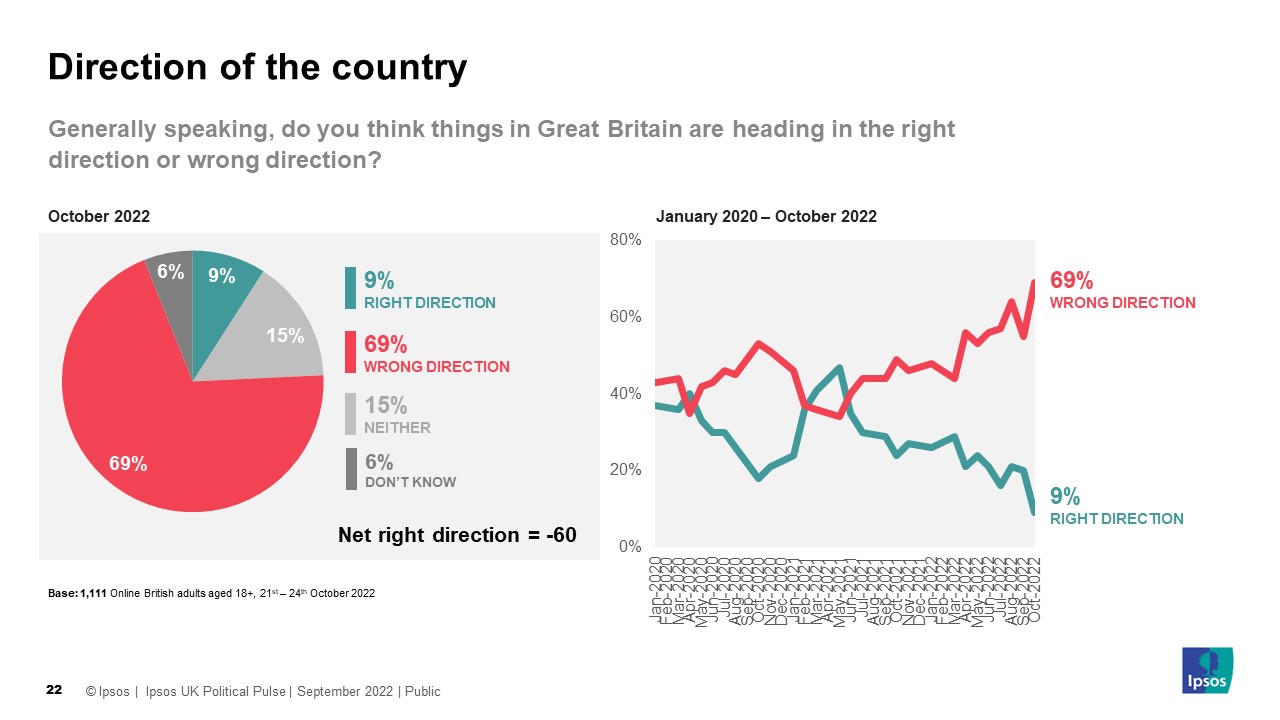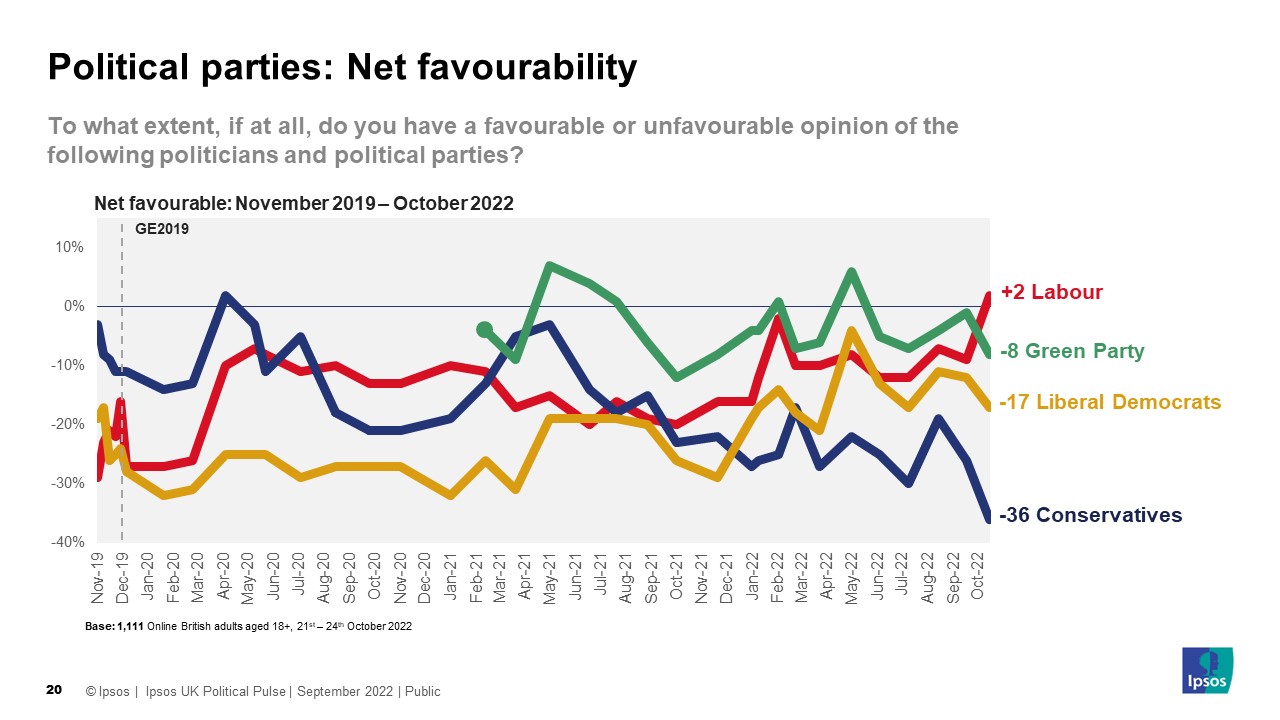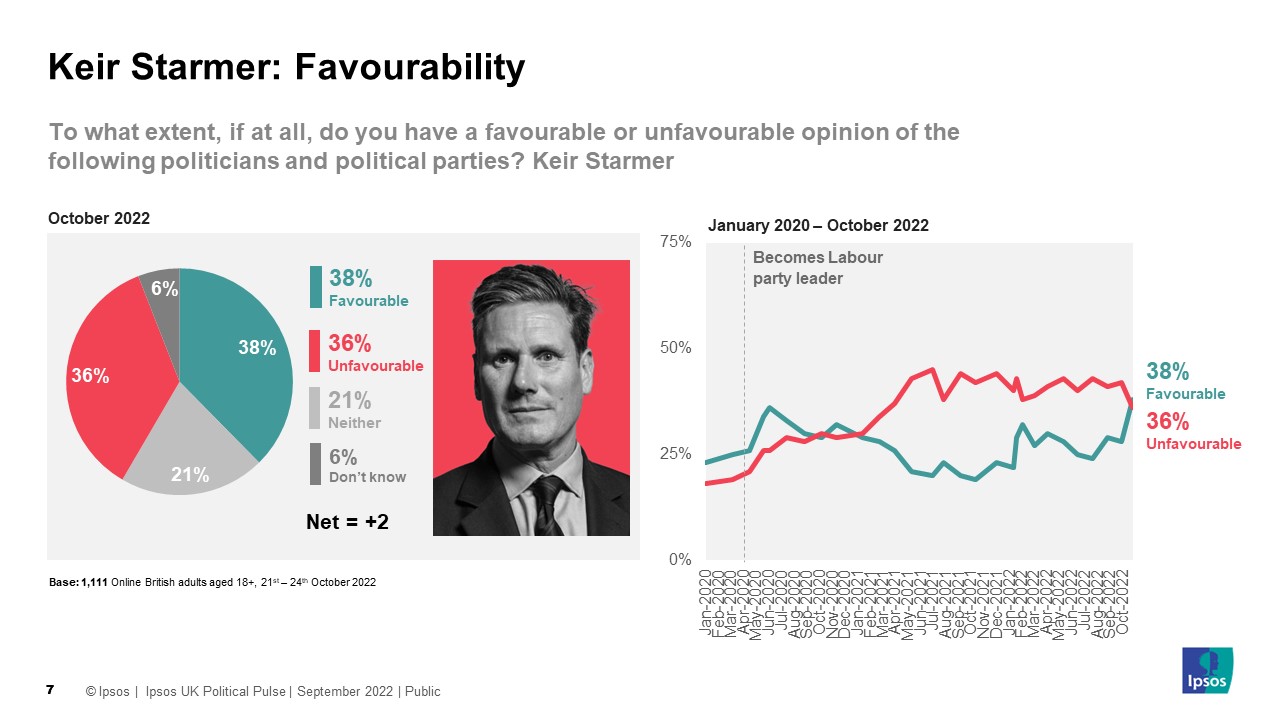69% say things in Britain heading in the ‘wrong direction’ – highest number since 2019 General Election
- Just 9% say Britain moving in ’right direction’ – lowest score since 2019 election
- 56% are unfavourable towards the Conservative party - the highest score since winning the 2019 General Election
- More Britons favourable than unfavourable towards Labour for first time since 2019 General Election
Ipsos in the UK’s latest Political Pulse, taken the weekend before Rishi Sunak became Prime Minister (21-24 October), reveals the challenges he faces in office as seven in ten (69%) say things in Britain are heading in the wrong direction (+14 since late September) - the highest level recorded since we began asking after the 2019 General Election. Fewer than one in ten (9%) say things are heading in the right direction (-11), which is the lowest proportion we have measured in that time.

How are parties perceived by the public?
The majority (56%) of Britons now have an unfavourable opinion toward the Conservative party (+6pts from September), against just one in five (20%) favourable (-4). These are both the worst scores the Conservatives have received since winning in 2019. In comparison, more of the public now feel favourable towards the Labour party than unfavourable for the first time in this series, although opinion still remains divided with 38% favourable (+8) and 36% unfavourable (-5).
Elsewhere, 20% are favourable towards the Liberal Democrats (-4) and 37% unfavourable (+1). 25% are favourable towards the Green party (-4) and 33% unfavourable (+3).

When asked who they think will win the next General Election, three in five (60%) now predict Labour will either win a majority or become the largest party – with more saying with a majority (44%) as opposed to largest party (16%). One in five (19%) expect the Conservatives to emerge with a majority or as the largest party, with opinion divided on whether this would be with a majority (10%) or the largest party in a hung parliament (9%).
This comes as one in three (32%) say the Labour party has the best policies to address the important issues facing the country (+9 since May 2022), while fewer than one in five (17%) opt for the Conservatives (-3).
How are leading politicians perceived by the public?
Public opinion captured the weekend before he became Prime Minister shows split perceptions of Rishi Sunak, although an improvement from August, with 34% favourable (+9) and 38% unfavourable (-8). His ratings are ahead of other leadership contenders from the weekend, including Boris Johnson (28% favourable, 50% unfavourable) and Penny Mordaunt (24%, 33%).
The narrative is similar for Keir Starmer who has also received a boost in his ratings despite opinion remaining divided. Two in five (38%, +10 since September) are favourable towards him with a similar proportion unfavourable (36%, -6). However, this is the first time his net favourability (+2) has been positive since November 2020.

Looking at the ratings of some of the recent Cabinet appointments made by Mr Sunak:
- Jeremy Hunt: 20% favourable, 43% unfavourable, 28% neither, 9% don’t know.
- James Cleverly: 13% favourable, 32% unfavourable, 30% neither, 26% don’t know.
- Suella Braverman: 14% favourable, 41% unfavourable, 26% neither, 20% don’t know.
- Thérèse Coffey: 10% favourable, 43% unfavourable, 28% neither, 19% don’t know.
- Kemi Badenoch: 12% favourable, 31% unfavourable, 29% neither, 27% don’t know.
- Ben Wallace: 23% favourable, 25% unfavourable, 31% neither, 21% don’t know.
- Grant Shapps: 14% favourable, 39% unfavourable, 29% neither, 17% don’t know.
Starmer vs Sunak head-to-head
Other polling conducted by Ipsos over the weekend (21-22 October), shows that Starmer has a 9pt lead over Sunak on who would make a better Prime Minister. In a head-to-head, one in three (34%) say the Labour leader would be better, compared to one in four (25%) who opt for Rishi Sunak. Around one in five (18%) say neither would be suitable, while around one in ten either say there is no difference between the two (13%) or they do not know (10%).
Where do the public stand on the impact of Brexit?
Around half (51%) say the UK’s decision to leave the European Union has had a negative impact on the country, reflecting similar highs reached in October 2021 (50%). Only 22% say its impact has been positive, the lowest levels Ipsos have recorded since this series began in January 2020, and the same proportion (22%) say it has made no difference.
Ipsos Director of Politics Keiran Pedley said of the findings:
These findings show the scale of the political challenge Rishi Sunak faces as he enters Downing Street. Almost 7 in 10 Britons think things are heading in the wrong direction. Meanwhile. a clear majority are unfavourable towards the Conservative Party and the public are ‘net positive’ about the Labour Party for the first time in this series. However, Mr Sunak will be encouraged at his own personal poll ratings improving and time will tell if negative perceptions of the Conservative Party are fixed, or if they dissipate following the departure of Liz Truss.
Technical note
These findings are taken from two polls:
- For most findings, Ipsos UK interviewed a representative sample of 1,111 Britons aged 18+. Interviews were conducted online from 21-24 October 2022.
- For the Starmer versus Sunak head-to-head scores, Ipsos UK interviewed a representative sample of 1,061 Britons aged 18-75. Interviews were conducted online from 21-22 October 2022.
In both cases data are weighted to match the profile of the population. All polls are subject to a wide range of potential sources of error.






